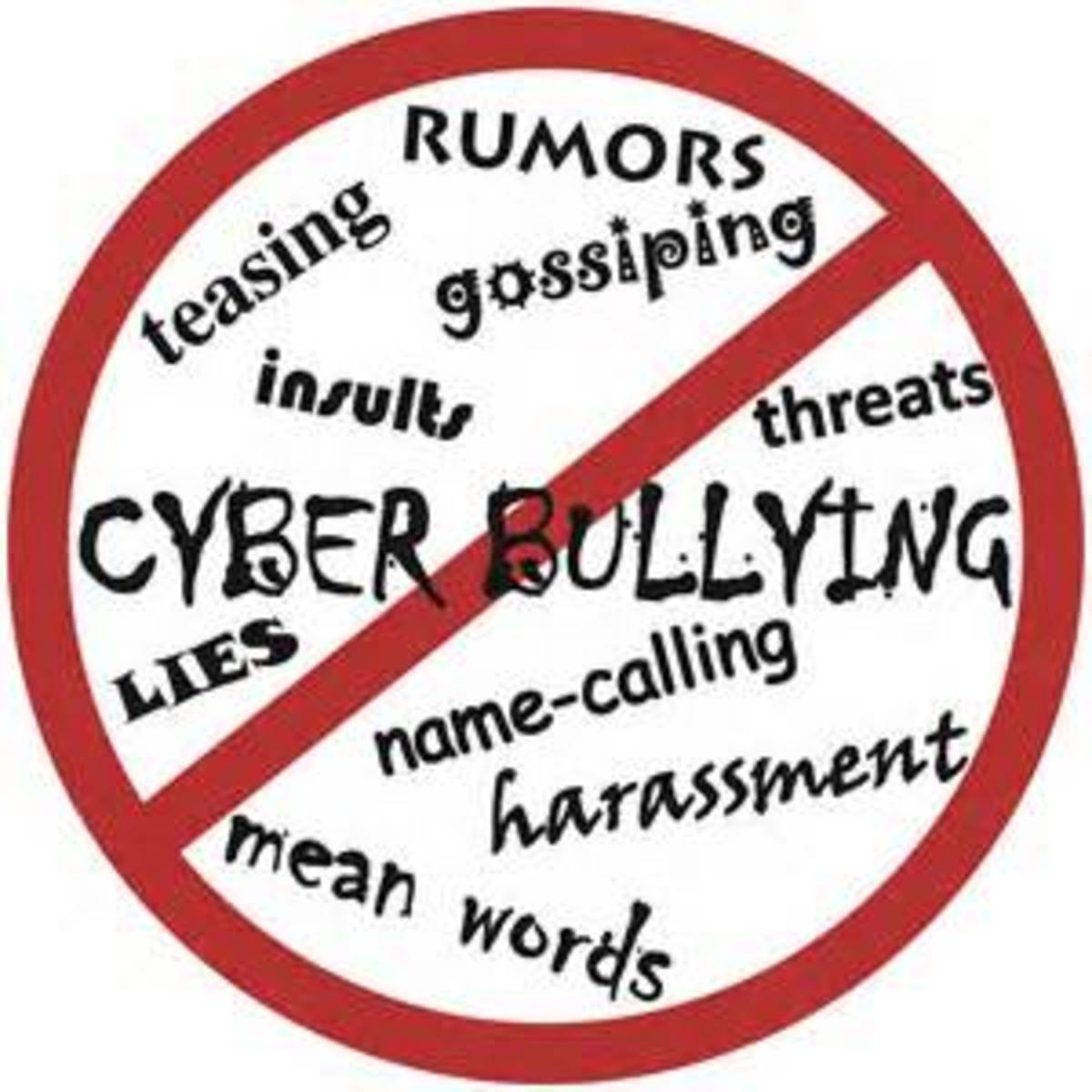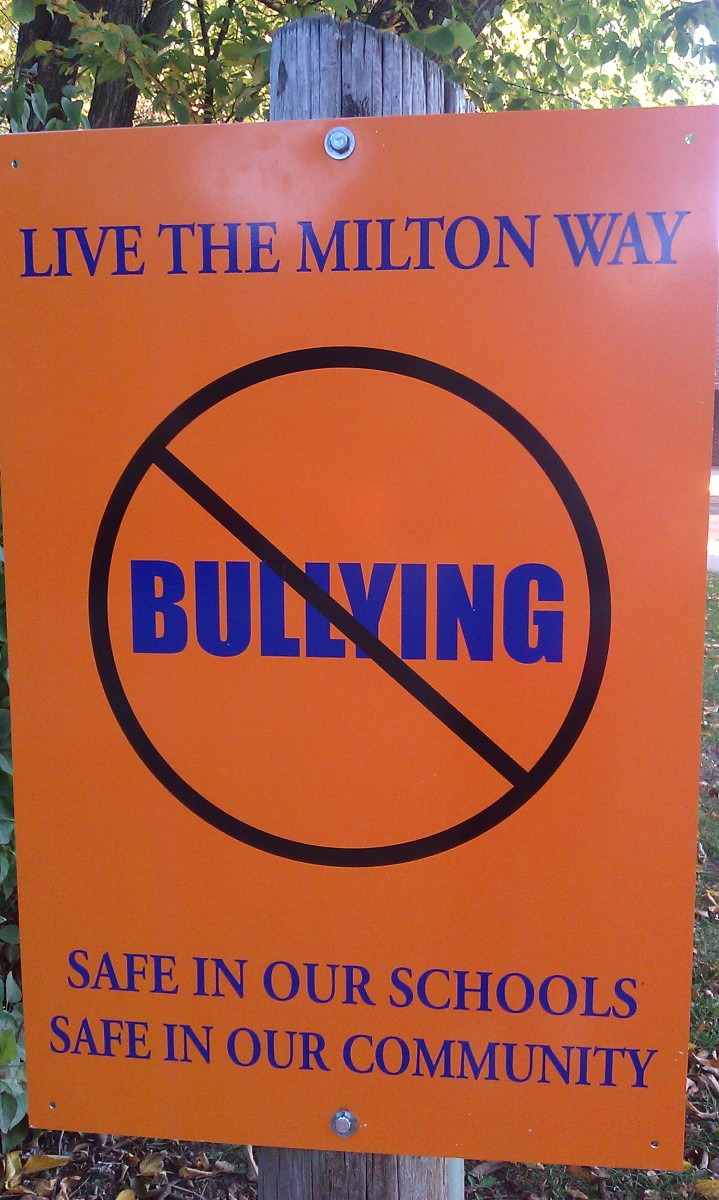21st Century Bullies: Cyber-bullying
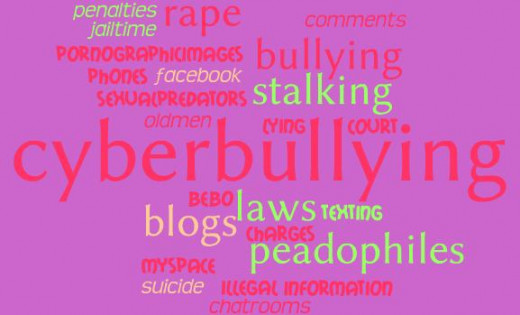
Adolescent Bullying Exascerbated by the Internet
Twenty years ago the form of bullying that affected children and teens across the country was the "school yard bully." Now, in the 21st Century bullying has become the most common form of bullying and is actually more damaging to the child and teenager than ever before. Cyber-bullying is more pervasive and impacts children and teens more than offline bullying does. The effect is magnified in online bullying. In Madison Wisconsin, 60% of cyber-bullying happens at the middle school level. Girls are more likely to become a cyber-bully than a boy.
According to iSAFE foundation's statistics, 1/2 of teens have been a victim of cyber-bullying. 1 in 10 will tell their parent that they were a victim and fewer than 1 in 5 will report it to the police. 1 in 10 children or teenagers have had damaging photographs taken of them without their permission, and often it is with a cell phone camera. 1 in 5 children and teens have posted or sent out sexually suggestive or nude pictures of themselves. Since 80% of minors have cell phones today, it has become the most common means of cyber-bullying. While half of teens have been a victim, 10-20% of them are victims on a regular basis.
Gender can sometimes determine the tactics the cyber-bully will use. Boys are more likely to use threats and post videos of fights. Girls are more likely to say mean things on social networking sights and in text messages. Girls as young as 12 and 13 years old have sent out suggestive pictures to older boys. The victims can develop depression, start to avoid going to school, some will strike back and start fights, they will develop anxiety, low-self esteem, and some attempt suicide.
Sex ting is illegal and children and teenagers don't realize this fact. A 15-year-old had been charged with creating and distributing child pornography. Even the Madison Wisconsin police department isn't aware at how prevalent the problem is. Sex-ting can turn deadly for vulnerable victims like the Cincinnati teen, Jesse Logan, who killed herself after nude pictures she had sent her boyfriend were distributed widely around campus-
This issue is not understood by many adults and that has actually made the problem even worse. They believe that it is like the "school yard bully" and this just isn't the case. This article is meant to provide some understanding regarding what Cyber-bullying is and some information that may help more individuals notice the problem and be able to step in and stop or prevent it from happening again. The more the adults are proactive in learning the "new" issues our teenagers and younger children are going through, the better equipped we are to assist in fixing and controlling the problem.
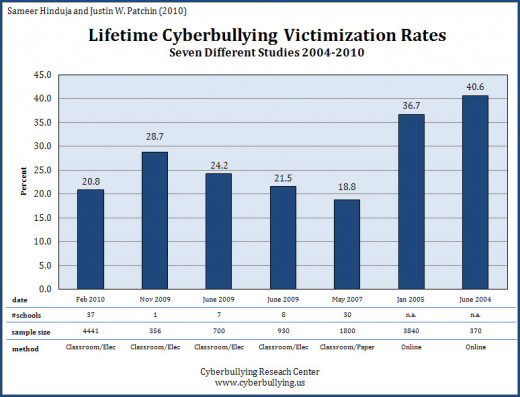

Have you been a victim of cyber-bullying?
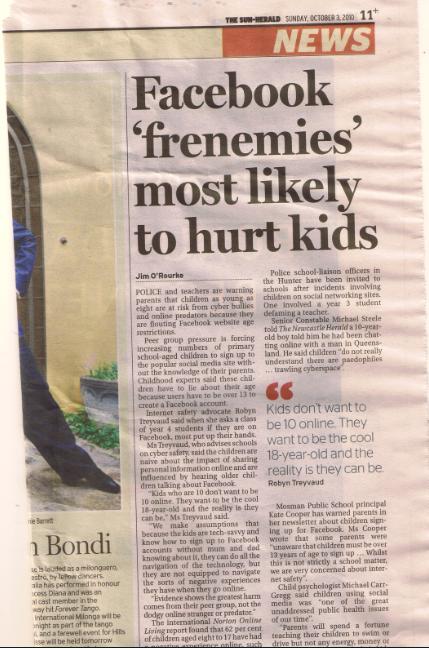
Understanding the Types of Cyber-bullying
Cyber-bullying is often motivated by anger, revenge, or frustration. Sometimes they do it for fun, entertainment, or out of boredom with too much time on their hands. The bully will do it just get laughs and/or attention and some do it just for the plain fact they like to torment someone else. There are also some teenagers that actually do it by accident by sending a message to the wrong person. Since there are different motives there should also be different solutions and responses to each incident.
There are four types of Cyber-bullying according to Stop Cyber-bullying.
- Vengeful Angel
- Power hungry (or) Revenge of the Nerds
- Mean Girls
- Inadvertent Cyber-bully (or) "Because I can"
The Vengeful Angel Cyber-bully
The teenagers don't view themselves as being a bully or that they did anything wrong. In their mind they are righting wrongs or protecting themselves or someone else. They generally work alone and after the fact, share what they did with others.
Power Hungry
These teenagers are trying to exert their authority to show they are powerful enough to make people do what they want them to or to control someone else with fear. They WANT to hurt someone or just don't like another teenager. Its very much like the school yard bully, just a different method. These kids NEED an audience and will brag about what they have done. If they don't get a reaction then it may excalate until they actually get one.
Revenge of the Nerds
Cyber-bullies of this nature were often victims of offline bullying and their intention is to frighten or ambarass their victims. They feel empowered because they never have to confront their victims and they target their victims one on one. All their online bully activity they keep from their friends and don't appreciate the seriousness of their actions. This is actually the most dangerous of cyber-bullies.
Mean Girls
Teenage girls that are bored and need some entertainment, ego-based, and the most immature of all cyber-bully types. They are mostly female and have planned and excuted the bullying in a group. This type requires an audience because their power grows in everyone's admiration and if they don't get the attention it quickly dies down.
Inadvertent Cyber-bully
These kids don't intend to bully and pretend to be touch online normally by responding to hateful messages that they get. They don't lash out intentionally and just respond without thinking. This happens because someone else hurt them.
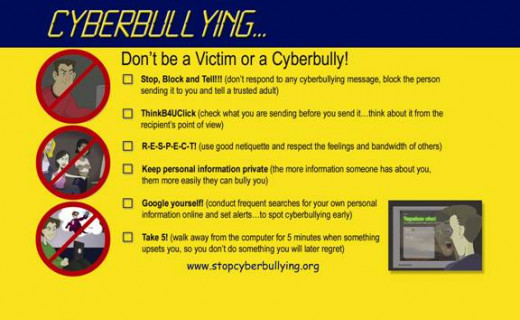
Victims of Cyber-bullying: Suicides

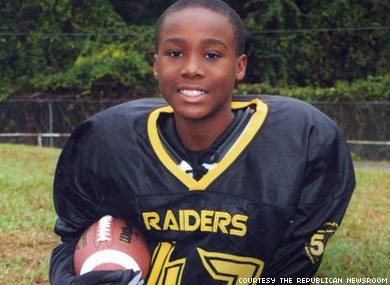

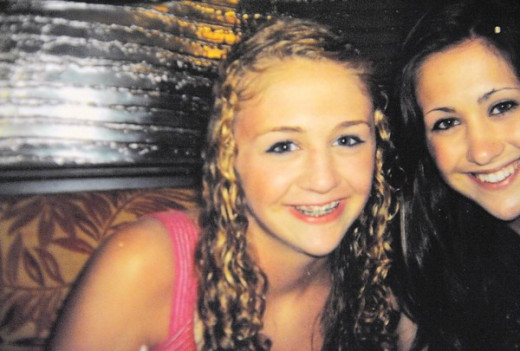

What to Watch and Keep Track of
The closer the bullying comes to real life threats, the more likely you can take it to your local police department. There are four types of cyber-bullying, ranging from mild to severe, according to Stop Cyber-bullying.
- flaming
- cyber-bullying
- harassment
- cyber-stalking
Kind of Threat
- foul language
- insults the child/teen directly
- threatens the child/teen vaguely ("I'm going to get you")
- threats of bodily harm ("I am going to beat you up/kick your ass")
- general serious (bomb at school)
- threats of serious bodily harm and/or death
Frequency of Threat
- one time occurrence
- repeated and in same or different ways (text messages, IM's, email, comments)
- the communication is increasing
- a third party joins the bullying, or so it appears
- communication starts coming from additional people
Source of Threats
- child knows the identity of the individual who is doing the bullying
- the child has no idea who is doing the bullying
- it appears to be several people
Remember, the bully may be unknown and think their identity is anonymous but there are ways that the identity of the individual can be found out
Nature of Threats
- repeated emails and/or instant messages
- the bully follows the child/teen online (chat rooms, websites, social networking)
- the bully makes fake social networking profiles, websites, or poses as the victim in a fake profile
- the bully starts signing the victim up for junk/spam mail and/or porn sites
- the bully breaks into the victims online accounts
- the bully steals or accesses the victims passwords
- the bully posts images of the victim online
- the bully posts real or doctored sexual images of the victim
- the bully shares personal information about the victim
- the bully reports the victim for service violations on sites that is bogus
- the bully shares the victims contact information combined with a sexual solicitation
- the bully posts and encourages others to post nasty comments on the victims blog or comment page
- the bully hacks the victims computer and sends malicious codes
- the bully attacks others posing as the victim
If You or Another Victim Feel Suicidal
If bullying means you, or someone you know, feels suicidal, please call 1-800-273-TALK (8255) in the U.S., or visitBefrienders Worldwide to find a helpline in your country.
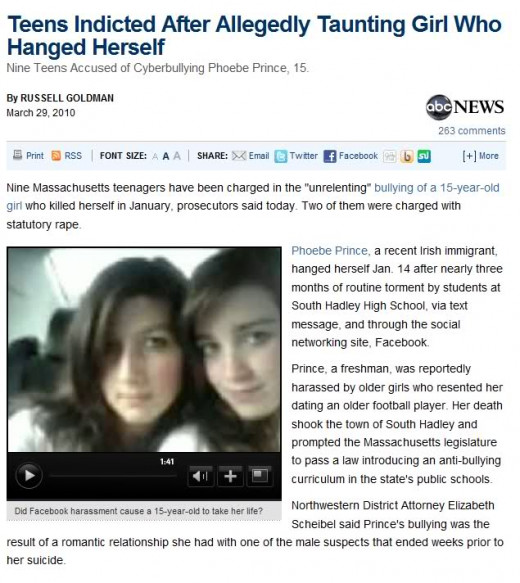
Cyber-bullied Suicide Victims


Why Cyber-bullying Hurts
Any form of Bullying is repeated aggressive behavior that can be physical, verbal, or relational and boys that bully are usually using threats of physical violence or actions in person while girls tend to bully through their relationships and engage in verbal threats and put-downs. No matter what tactic the bully uses the end result is pretty much the same.
The victim becomes hurt and angry, afraid, helpless and has feelings of hopelessness. Through the process of the bullying they start to feel isolated, especially if more individuals join in or watch the bullying being done. They may not actually partake in it but find it enjoyable to watch, laugh, point, stare, spread the bullying posts around the web etc. Even guilt can overcome the victim as they blame themselves for the bullying, that they brought it on themselves. It can get to the point the victim doesn't see an end to the torment and thinks of suicide.
It starts to take a toll on the victims health and they become at high risk for developing other issues such as mental disorders. The most common mental issues would be depression an anxiety. There is also the problem of developing low self-esteem, losing confidence in themselves, a distorted self-image, and become unsure of themselves. It is even been documented that some victims will develop adult onset post-traumatic stress disorder, otherwise known as PTSD.
Victims become afraid of confronting the people that are doing the bullying or ashamed or embarrassed around those that have seen or heard the reports of the bullying. They start to avoid going to school, skip classes, or even drop out of high school due to the extent of the bullying. You may even think your child has been attending school, but after they arrive (if you drop them off) they will ditch school and find somewhere to hang out until school is over and they can go home.
The thing with cyber-bullying is its ongoing and doesn't seem to stop, very repetitious and that is the dangerous part of the whole thing. It can last for long periods of time where the victim is in constant fear of what the bully will do next, what they will say, who will see it, and how far they are going to go to hurt them. Bullies have no limit and are relentless, some want to destroy their victim and will encourage the victim to commit suicide as the "world would be better off without them." With cyber-bullying its worse than the traditional school yard bully, because the Internet is 24 hours a day, 7 days a week. With school yard bullies, once the bell rang and you went home you were free from the torment. Same with weekends and holidays and school breaks. With the internet, there is no break. They have an audience around the clock that reaches all over the globe. Once something is posted there is a strong possibility it will be there forever.
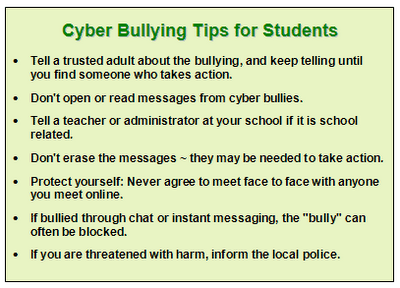
Cyber-bullied Suicide Victims



Tips to Prevent Cyber-bullying
It is important for parent to teach their children safe techniques and practice of internet usage and also monitor the activity. By educating your child on strategies to avoid or deal with cyber-bullying you take a proactive stance that will help prevent it from going to far. Here are some tips to teach your children so that they can make themselves less of a target.
- Never agree to deliver messages that contain cyber-bullying content.
- If one of their friends or acquaintances are bullying someone online, confront your friend and tell them to stop.
- Always block any communication that the cyber-bully sent or posted. Print and document the ones that were seen and delete messages without reading them.
- That they are forbidden from sharing certain kinds of information that may be used at some point to stalk and/or hurt their victim physically. Such as, full name, address, phone numbers, their school name, their family members names, no credit card or checking account information, and no Social Security numbers. Teach them what these kinds of information can do for someone that has them.
- Always give the updated password to the designated parent so that it can be monitored for any abuse. Tell them never to share passwords with anyone; not boyfriends, friends, or best friends because if they have a falling out they will be able to access it and use the account against them. Explain to them that even if they are friends, that its possible that they could invade their accounts for any reason and they put themselves in a vulnerable position.
- To never talk about their personal and family life online.
- Even if they are using private and secured email, never write anything they wouldn't want anyone else; especially their classmates to see. Nothing is one hundred percent safe on the internet.
- Teach them that its not okay to compose email, respond to posts or comments, or send texts or IMs if they are angry. They have a more likely chance of saying or doing something or even giving out to much detail or information because they aren't thinking clearly when they are upset. They may make a situation worse or become a bully without realizing it.
- Don't assume everyone is who they say they are. Accept only friend requests from people you know in person. Set your profile to friends only. Delete or don't add people just because you know of them at school because many kids put what they call "frenemy" on there and they cause problems at some point.
- Always treat the people online as you would in person and give them respect. But be aware that communication in writing via text, email, etc. lacks the necessary non-verbal communication like body language. This makes someone's intent or meaning sometimes difficult to interpret. So they need to be vigilant in making sure they don't get into a misunderstanding because of something being typed wrong.
Megan Meier Bullied by Adult Who Created Fake Profile
Cyber-bullying Resources
- Bullying Prevention: Tips for Teachers, Principals, and Parents | Edutopia
Blogger Anne O'Brien shares valuable bully prevention tips for teachers, parents, and principals. - Bullying Tips for Parents - www.legacyproject.org
Safe Schools Program resource from the Legacy Project - Home | StopBullying.gov
Bullying can happen anywhere and to anyone. Get the information that you need to help stop bullying at school, online, and in the community. For more information, visit StopBullying.gov. - Tips for Parents | Free Resources > Bully Free Program
Suicide Victims of Cyberbullying


How to Help You Child if They Have Been Cyberbullied
- Ask your child the "Where", "How", and "What" questions and listen to them without interrupting. Avoid demanding who they are and refrain from phrasing things to make it sound like you are attacking them.
- Document everything, keep a log or journal of dates and times and the method of the bullying. If it is schoolyard bullying, take pictures of any physical injuries sustained.
- It might be helpful to encourage your child to write down the events and their feelings, like a journal.
- Always validate the child's feelings and let them know that it is okay to feel the way they do.
- It is important not to counter their statements after "They hate me at school" with "Of course they don't". This invalidates their feelings and perceptions and gives them the perception you don't understand. The lines of communication may then be compromised and you will be shut out of what is going on with your child.
- Don't jump the gun without hearing all of the details, and avoid placing any blame.
- Just like with victims of other crimes, they may feel like they deserved it. Reassure them that no one deserves to be treated like that and bullying is not okay.
- Educate yourself as to why bullies act the way they do so you can explain it to your child. They aren't going to understand why someone would want to hurt them that way, especially if your child wouldn't do it to someone else.
- Not all situations are black and white. It is important to ask yourself if your child could have contributed to it in anyway. Did they take part in some previous cyber-bullying and got retaliated on?
- Never encourage your child to seek revenge and retaliate, instead explain why they shouldn't do it.
- Impossible as it is as a parent, and despite the fact it might have worked when you were a child, don't tell them to "just ignore it". Bullying of this magnitude won't just necessarily go away because they ignore it. In fact, in some situations it will get worse.
- However, even if they can't ignore it, do encourage your child to avoid the bully at school or other places if at all possible and if they know the identity of their tormentor.
- Without mentioning the bullying, and without raising too much suspicion, ask other parents and children about the bully.
- Do not make promises you are bound to break like you won't tell anyone.
- Give them hope that a solution will be found and that you won't make anything worse in the process.
- You need to contact the school administration and the teachers of the problem, but don't be seen at the school or the bully will likely find out and make things worse for your child.
- Another important thing is give the child a safe adult they can report to at school daily where they likely will encounter their bully. Have them report to the same teacher daily and if there is ever an incident or problem the teacher is to contact you directly.
- If you have enough to file charges against the bully, do so.
- It might be also beneficial, especially if physical threats or encouragement of suicide are being said that you request a restraining order.
- It is a good time to start monitoring the friendships your child has.
- When you re-hash an event it can make the anger grow and retaliation more likely so limit communication via phone and text and computer with child's friends and/or peers to avoid anything of that nature.
- Educate yourself on the signs and symptoms of suicidal thoughts, depression, anxiety, and isolation so you can see a problem before its out of control and get professional help immediately.
- Post Traumatic Stress Disorder is seen in bullying situations so also learn the signs and symptoms for that and get them to a medical professional if you get concerned they are suffering from it.
- Whenever there is a decision on what needs or should be done in the process, keep your child in the conversation and decision making process.
- As a last resort, transfer your child to another school district
Suicide Victims of Cyberbullying








